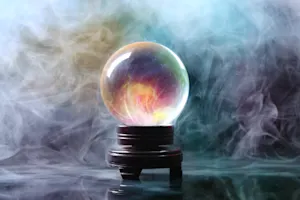What Makes This Word Tick
"Luminescent" is a word that seems to shimmer even on the page, evoking an image of gentle, glowing light that doesn't rely on heat. It's quite the scientific darling, associated with phenomena that produce light through chemical reactions, like fireflies winking in the summer dusk or certain jellyfish floating through the ocean's dark expanse.
If Luminescent Were a Person…
Picture a charismatic artist, always the center of attention at gatherings, not because they're loud, but because they have a certain glow that draws people in. They're not just about flashy appearances; there's a depth and warmth in their aura that’s truly captivating, much like a soft lantern glowing on a dark night.
How This Word Has Changed Over Time
Originally rooted in the Latin "lumen," meaning light, the word "luminescent" has maintained its sense of glowing admiration, even as its scientific and artistic contexts have evolved. From medieval candles to modern LEDs, luminescent has stayed true to its essence, simply taking on new technological forms.
Old Sayings and Proverbs That Use Luminescent
While not featured in old proverbs, one could imagine a wise old saying like, "A luminescent heart lightens the darkest path," highlighting the word's metaphorical potential to describe warmth and guidance.
Surprising Facts About Luminescent
Did you know that certain types of mushrooms, known as bioluminescent fungi, can glow in the dark forest floors? This mysterious phenomenon isn't just a fairy tale—it’s a real-world spectacle that can make you feel as if you’ve wandered into an enchanted forest.
Out and About With This Word
"Luminescent" is often at home in science museums, art exhibits, and nature documentaries. Whether you're observing exotic glowing creatures or exploring light-based art installations, this word tends to pop up wherever light brings life to otherwise dark realms.
Pop Culture Moments Where Luminescent Was Used
Think of James Cameron’s "Avatar," where luminescent flora illuminated the alien world of Pandora, creating a visual feast that was both otherworldly and mesmerizing. Such cinematic moments showcase how luminescent elements can dazzle audiences and set a scene's mood.
The Word in Literature
In literature, "luminescent" adds a poetic layer when describing settings or emotions. It's the sort of word you might find in a lyrical passage about the moon reflecting off an placid lake or a protagonist's eyes gleaming with sudden understanding.
Moments in History with Luminescent
Imagine the look of wonder when Marie Curie discovered the glowing properties of radium in the late 1800s. While "luminescent" might not have been directly quoted, its spirit certainly was present during those groundbreaking moments in the world of science.
This Word Around the World
In Japan, "komorebi" describes sunlight filtering through trees, an experience reminiscent of luminescence when the light falls just right. Across languages, the concept of a gentle glow is universally understood, whether it's the Northern Lights or a simple candle's glow.
Where Does It Come From?
The word "luminescent" takes us back to the Latin "lumen," which means light. This classical root has illuminated the way for various words across different fields, all tied by their shimmering quality.
How People Misuse This Word
Some people might mistakenly use "luminescent" to describe physically hot light sources, when it’s actually more about the cool light phenomena that don’t involve heat—like the soft, ambient glow of glow-in-the-dark stars on a child's bedroom ceiling.
Words It’s Often Confused With
Incandescent: Often confused with luminescent, incandescent actually refers to light produced by heat.
Fluorescent: While similar, fluorescent light is specifically produced by mercury vapor and phosphor coating, not quite the gentle glow of luminescence.
Phosphorescent: This is a type of luminescent light, but it refers more specifically to materials that emit light after exposure to radiation.
Additional Synonyms and Antonyms
Synonyms for "luminescent" include radiant, glowing, and lucent. Antonyms would be opaque, dark, and dull, capturing the absence of light's gentle touch.
Want to Try It Out in a Sentence?
Imagine stepping into an enchanted garden, where the luminescent glow of moonlit flowers lights up the path ahead, each petal a tiny beacon in the night.
















